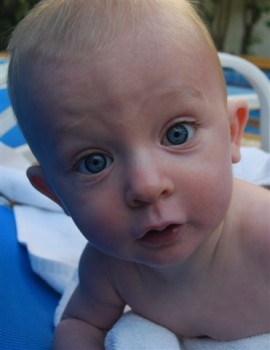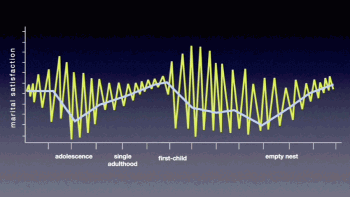 Any day now, my wife Catherine and I are expecting the birth of our second son. It is a bit nerve wracking since the first pregnancy was somewhat difficult. But our son Dylan has been an absolute joy and we have loved inviting him into our lives. Our plan is to stop at two, so I was somewhat taken aback when I saw this new study showing that the secret to marital happiness is to have either no kids or at least four.
Any day now, my wife Catherine and I are expecting the birth of our second son. It is a bit nerve wracking since the first pregnancy was somewhat difficult. But our son Dylan has been an absolute joy and we have loved inviting him into our lives. Our plan is to stop at two, so I was somewhat taken aback when I saw this new study showing that the secret to marital happiness is to have either no kids or at least four.
Research shows that all other things being equal, on a moment by moment basis, most parents are actually less happy than those without kids. This kind of study asks research participants the question, “What are you doing right now and how do you feel?” It’s not too surprising that changing diapers, wiping mashed sweet potato off the walls, or breaking up a fight between your two children are lower down on the list than going on a date, watching football with your buddies or having a drink with a friend. And yet parents (including us) regularly either stubbornly or delusionally deny this simple fact of science, saying that being a parent has been the most meaningful and joyful part of their lives. How do we explain this apparent paradox?
One obvious possibility is that the parents are lying—an apparent trick to convince non-parents to make the same mistake they did. After all, misery loves company and if we have to be woken up at 4 a.m. by a screaming child, well, you should too. The other possibility is that parents are lying to themselves. Rather than accept the fact that we have traded a great life of singledom for the burdensome responsibility of raising a family, we delude ourselves into believing that our lives are somehow better for the experience.
Of these two options, the latter option is likely to be the closest to the truth, but it still doesn’t tell the whole story. To a certain extent, we all delude ourselves about everything because our memories are not so much exact recordings of our experiences, but rather stories that we create to tell ourselves that are often only loosely based on reality. Psychologist Daniel Kahneman refers to these two sides of human existence as the “experiencing self” and the “remembering self.”
Kahneman has found that we tend to give more weight to the remembering self than we do to the experiencing self. In many ways, this makes perfect sense since the experiencing self only has a collection of fleeting moments while the remembering self can continue to revisit these stories in perpetuity. This leads to two kinds of happiness. People have happiness “in their life” in the moment to moment experience of it, and happiness “about their life” as they reflect on it later.
This could explain the parental happiness paradox as parents may have less happiness in their life as they deal with an endless stream of dirty diapers, temper tantrums and eventually teenage angst. But they have much more happiness about their life as they feel the satisfaction of watching their children grow up to be successful adults, take pride in their accomplishments as a parent or imagine their hopes for the future.
In a TED Talk on Parenting Taboos, Rufus Griscom and Alisa Volkman theorize that the decline in average happiness does not tell the story of the incredible moment to moment peaks and valleys that parents experience. In other words, while the average happiness line tends to sag downward during the parenting years, this is actually an amalgam of experiences that include some of the highest highs and the lowest lows. 
This idea seems to be aligned with Kahneman’s research, which shows that the remembered enjoyment of an experience is heavily influenced by the peaks of the experience (positive and negative) and by how the experience ended. Despite the fact that average happiness may be lower for those with children, they are experiencing incredible peaks of joy that non-parents may never or rarely get to feel. Just like the pain of childbirth seems to fade away, almost the instant a child is born, so too do the memories of many late nights of despair trying to soothe a crying baby back to sleep, or confronting diaper changes that a hazmat crew would call for reinforcements on.
What never fades are those peak moments of joy as your baby smiles for the first time, looks you in the eye and says “da da,” or takes his or her first steps. In those moments there is no question that being a parent is the most meaningful and joyful part of your life.
The parental paradox is an example of the problem with thinking of happiness only in the context of positive emotions. Even if the sum total of positive experience is lower for parents, “happiness” or “flourishing” should not be measured by positive emotions alone. There are many times in life when negative emotional reactions are connected to experiences of profound meaning.
Perhaps the parental paradox comes from the deeply profound sense of meaning, purpose and even joy, that can come when personally sacrificing for the betterment of those you love more than anything in the world. One thing is for certain: parenthood can be like a rollercoaster, and we’re about to start another ride.
P.S. If you are wondering how more than four children can lead to greater happiness, there’s an excellent article on the study here: http://bigthink.com/ideas/41697. But I still plan to try my luck with only two, thank you very much.

Great article, Jeremy. As a (very young) parent of three and now a grandparent of seven, I can only echo the notion that “happiness” and “flourishing” cannot be measured in terms of positive emotions alone. Sharing the lives of these Persons who (most often) share your blood and for whom you are responsible for a good portion of their lives as they go about the business of “becoming,” involves experiencing the full gamut of emotions from intense elation to utter despair. Interestingly, both as their parent and on their behalf. When your kid comes home from school one day, sobbing uncontrollably because she or he was made fun of by one of the “popular” kids, trust me, your heart breaks along with him or her. One tiny example…..
Those who do not “feel” along with their children cannot be emotionally open and connected to their offspring, in my humble opinion. The rewards? Today, I am in constant positive contact with all three kids (no I do NOT try to manage their lives) and the same with the grandkids. Joy!
Trust that all will go splendidly for Catherine and the new one!
Hi Jeremy,
It’s great to have the time to read your blogs because your writing is always so interesting. When I think back to those years of raising small children with dirty diapers, I do remember they were challenging and really not a lot of fun. And that changed one day when I read the book “Peace is Every Step” by Thich Nhat Hanh. It is a classic book about mindfulness. I realized that even when I was changing diapers, I could be mindful and be in love with what I was doing or I could be dreading the experience. I decided that happiness came in moments throughout the day and that I could decide to experience them or not. This still does not change my mind about having only two children!
I am so excited about your new baby. I hope all goes well with Catherine as she delivers and wish you all the best. Can’t wait to see the photos!
My favorite role in life, so far, is being a mom/parent. My child rearing philosophy is in synch with the poem by Kahil Gibran regarding Children… How they come from your body, but do not belong to you. I loved (and still do) making sure our two kids were responsible for any task they could do … Figuring out what clothes to bring on a trip at 3, doing laundry ay 10, etc. Yes, there were certainly challenging moments, but keeping a positive orientation (most of the time) and getting support from others helped. ALOT. Your kids are lucky to have you both. It is such an incredible roller coaster ride! And now since our kids are adults it is pure joy! Can’t wait for the big news and photos! PS. I would not consider having more kids than the number of parents!
I would like to tag on to what Louisa wrote, and say that I found that the love and the compassion I had for this new person for whom I was responsible far outweighed any diaper mishaps….even the one where I picked him up on the way to a gathering and the poop ran down all over him, me and the car seat! (yeah, I’m laughing now; but more importantly, I was laughing then: what else was there to do?)
Not that I didn’t have my fears. I wrote this on my son’s 25th birthday:
“Twenty-five years ago, after minutes less than fourteen hours from first pang to last push, I held in my arms the greatest gift I have ever been given. Four hours later, placing my newborn babe into by brother’s arms, I said. “It’s anybody’s guess, now: in 25 years he’ll be in some shrink’s office saying ‘…she nursed me too much; …she didn’t nurse me enough; …she forced me to have piano lessons; …she wouldn’t give me piano lessons…’ BUT regardless of the triumphs and the mistakes….he will know that whatever he is, or will turn out to be, he is greatly and deeply loved by me.”
Intuitive as I am, this didn’t take the use of any intuition at all. When we start out as parents, none of us knows how it will all turn out. We do what we
know, we learn new things, and let our hopes (and sometimes our fears) guide us in raising our children….”
to read how the story ends, go here: http://rileyschool.wordpress.com/2011/10/19/25-years-later-3/
I am not sure it has anything to do with how many children, but I am sure that it has everything to do with the consciousness of parenting.
Blessings to you and yours!
Great Article, and very useful. Thank you. The superficial understanding of “happiness” as feeling happy is so dominant today, and is almost irrelevant to the ingredients of a good life both for ourselves and our children. When your children fail or get into conflicts, or otherwise suffer, I hope you remember that their good life depends on rising to challenges, and not on feeling good.
(That’s my virtual paternal blessing.)